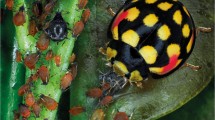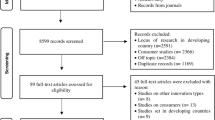Abstract
Drawing from contemporary social science studies on the shifting regime of research governance, this paper extends the literature by utilizing a metaphoric image—research is a game—observed in a field engagement with 82 American, British, and Danish crop and plant scientists. It theorizes respondents’ thinking and practices by placing the rules of the research “game” in dynamic and interactive tension between the scientific, social, and political-economic contingencies that generate opportunities or setbacks. Scientists who play the game exploit opportunities and surmount setbacks by adopting strategies and reinventing tactics in order to maximize their winnings and to minimize their losses. Winners become superstars who decree what is open, closed, or doable science for the majority of the scientific community.
Similar content being viewed by others
References
Barnes, Barry. 2007. Catching up with Robert Merton: Scientific collectives as status groups. Journal of Classical Sociology 1: 179–192.
Bloor, David. 1997. Wittgenstein, rules and institutions. New York: Routledge.
Bruno, Isabelle. 2009. The ‘indefinite discipline’ of competitiveness benchmarking as a neoliberal technology of government. Minerva 47: 261–280.
Calvert, Jane. 2004. The idea of ‘basic research’ in language and practice. Minerva 42: 251–268.
Calvert, Jane. 2006. What′s special about basic research? Science, Technology & Human Values 31 (2): 199–220.
Colyvas, Jeannette A. 2007. Factory, hazard, and contamination: The use of metaphor in the commercialization of recombinant DNA. Minerva 45: 143–157.
Crust, Lee. 2009. Sports psychology: Mental toughness. http://www.pponline.co.uk/encyc/sports-psychology-mental-toughness-14. Accessed 06 November 2009.
Crust, Lee, and Ian Lawrence. 2006. A review of leadership in sports: Implications for football management. Athletic Insight 8 (4): 28–48.
Cumming, Dennis. 2009. Examining the future of sports journalism. July 02, 2009 07:00 am. http://www.findingdulcinea.com/news/sports/2009/july/Examining-the-Future-of-Sports-Journalism.html. Accessed 06 November 2009.
DeJager, Timothy. 1993. Pure science and practical interests: The origins of the agricultural research council, 1930–1937. Minerva 31 (2): 129–150.
Dweck, Carol. 2006. Mindset: The new psychology of success. New York: Ballantine.
Etzkowitz, Henry, and Loet Leydesdorff. 2000. The dynamics of innovation: From national systems and “Mode-2” to a triple helix of university—industry—government relations. Research Policy 29 (2): 109–123.
Gieryn, Thomas F. 1983. Boundary-work and the demarcation of science from non-science: Strains and interests in professional ideologies of scientists. American Sociological Review 48 (6): 781–798.
Godin, Benoit. 1998. Writing performative history: The new New Atlantis? Social Studies of Science 28 (3): 483–565.
Gozzi, Raymond. 1999. The power of metaphor in the age of electronic media. Cresskill: Hampton.
Hogler, Raymond, Michael A. Gross, Jackie L. Hartman, and Ann L. Cunliffe. 2008. Meaning in organizational communication: Why Metaphor is the Cake, not the Icing. Management Communication Quarterly 21 (3): 393–411.
Keller, Evelyn Fox. 1995. Refiguring life: Metaphors of the twentieth-century biology. New York: Columbia University Press.
Kline, Ronald. 1995. Construing ‘technology’ as ‘applied science’: Public rhetoric of scientists and engineers in the United States, 1880–1945. ISIS 86 (2): 194–221.
Knudsen, Susanne. 2005. Communicating novel and conventional scientific metaphors: A study of the development of the metaphor of genetic code. Public Understanding of Science 14: 373–392.
Koch, Susan, and Stanley Deetz. 1981. Metaphor analysis of social reality in organizations. Journal of Applied Communication Research 9 (1): 1–15.
Lakoff, George, and Mark Johnson. 1980. Metaphors we live by. Chicago: University of Chicago Press.
Maasen, Sabine, and Peter Weingart. 1995. Metaphors—messengers of meaning: A contribution to an evolutionary sociology of science. Science Communication 17: 9–31.
Maasen, Sabine, and Peter Weingart. 2000. Metaphors and the dynamics of knowledge. New York: Routledge.
Malaby, Thomas M. 2007. Beyond play. A new approach to games. Games & Culture 2 (2): 95–113.
Merton, Robert. 1968. The Matthew effect in science. Science 159: 57–63.
Merton, Robert. 1973 [1942]. The normative structure of science. In: The sociology of science: Theoretical and empirical investigations, ed. Robert Merton, 254–278. Chicago, IL: University of Chicago Press.
Morris, Norma. 2000. Science policy in action: Policy and the researcher. Minerva 38: 425–451.
Morris, Norma. 2003. University researchers as ‘agents’ of science. Science and Public Policy 30 (5): 359–370.
Nicholson, Yvonne Grinam. 2009. The publicist who keeps Usain Bolt on track. Jamaica Observer. Business section. Wednesday, October 21, 2009. http://www.jamaicaobserver.com/magazines/Business/html/20091020T2000000500_162214_OBS_THE_PUBLICIST_WHO_KEEPS_USAIN_BOLT_ON_TRACK.asp. Accessed 06 November 2009.
Nowotny, Helga, Peter Scott, and Michael Gibbons. 2001. Re-thinking science. Knowledge and the public in the age of uncertainty. Oxford: Polity.
Palladino, Paolo. 1990. The political economy of applied research: Plant breeding in great Britain, 1910–1940. Minerva 28 (4): 446–468.
Pestre, Dominique. 2003. Regimes of knowledge production in society: Towards a more political and social reading. Minerva 41: 245–261.
Pestre, Dominique, and Peter Weingart. 2009. Governance of and through science and numbers: Categories, tools and technologies-preface. Minerva 47: 241–242.
Polanyi, Michael. 2000. The republic of science: Its political and economic theory. Minerva 38 (1): 1–21.
Pryor, Robert George Leslie, and Jim E.H. Bright. 2009. Game as a career metaphor: A chaos theory career counselling application. British Journal of Guidance and Counselling 37 (1): 39–50.
Shapin, Steven. 2008. The scientific life: A moral history of a late modern vocation. Chicago: University of Chicago Press.
Shinn, Terry. 2002. The triple helix and new production of knowledge: Prepackaged thinking on science and technology. Social Studies of Science 32: 599–614.
Steinkuehler, Constance. 2006. The mangle of play. Games & Culture 1 (3): 199–213.
Vallas, Steven Peter and Kleinman, Daniel Lee. 2008. Contradiction, convergence and the knowledge economy. The confluence of university and commercial biotechnology. Socio-Economic Review 6 (2): 283–311. doi:10.1093/ser/mw1035.
Zagal, Jose P., Rick Jochen, and Idris Hsi. 2006. Collaborative games: Lessons learned from board games. Simulation & Gaming 37 (24): 34–40.
Acknowledgments
The study was supported by a grant from [the Danish Social Science Research Council] Forskningsraadet for Samfund og Erhverv (FSE); grant no. 275-06-0335 (Science Policy Imaginations and Expectations—Scientists’ Experiences and Perspectives). Thanks to FSE for this support. The author is greatly indebted to interviewees for their openness, time, and their thoughts. Thanks to Arne Thing Mortensen, Claus Emmeche, and Brian Wynne for their invaluable support and comments. The author would like to thank the three anonymous referees for their invaluable comments and suggestions, and the editors for their invaluable comments, guidance and support. The British data was collected by the author between August 2005 and January 2006 as part of the “Plant Genomics and Commercialization” Project at ESRC Centre for Economic and Social Aspects of Genomics (CESAGen), Lancaster University, UK. Thanks to Brian Wynne, Claire Waterton, Jane Taylor and Katrina Stengel for enrolling me in this project and for their comments. Of course, any problems or errors remain the responsibility of the author.
Author information
Authors and Affiliations
Corresponding author
Rights and permissions
About this article
Cite this article
Kamara, M.W. The Typology of the Game that American, British, and Danish Crop and Plant Scientists Play. Minerva 47, 441–463 (2009). https://doi.org/10.1007/s11024-009-9135-1
Published:
Issue Date:
DOI: https://doi.org/10.1007/s11024-009-9135-1




